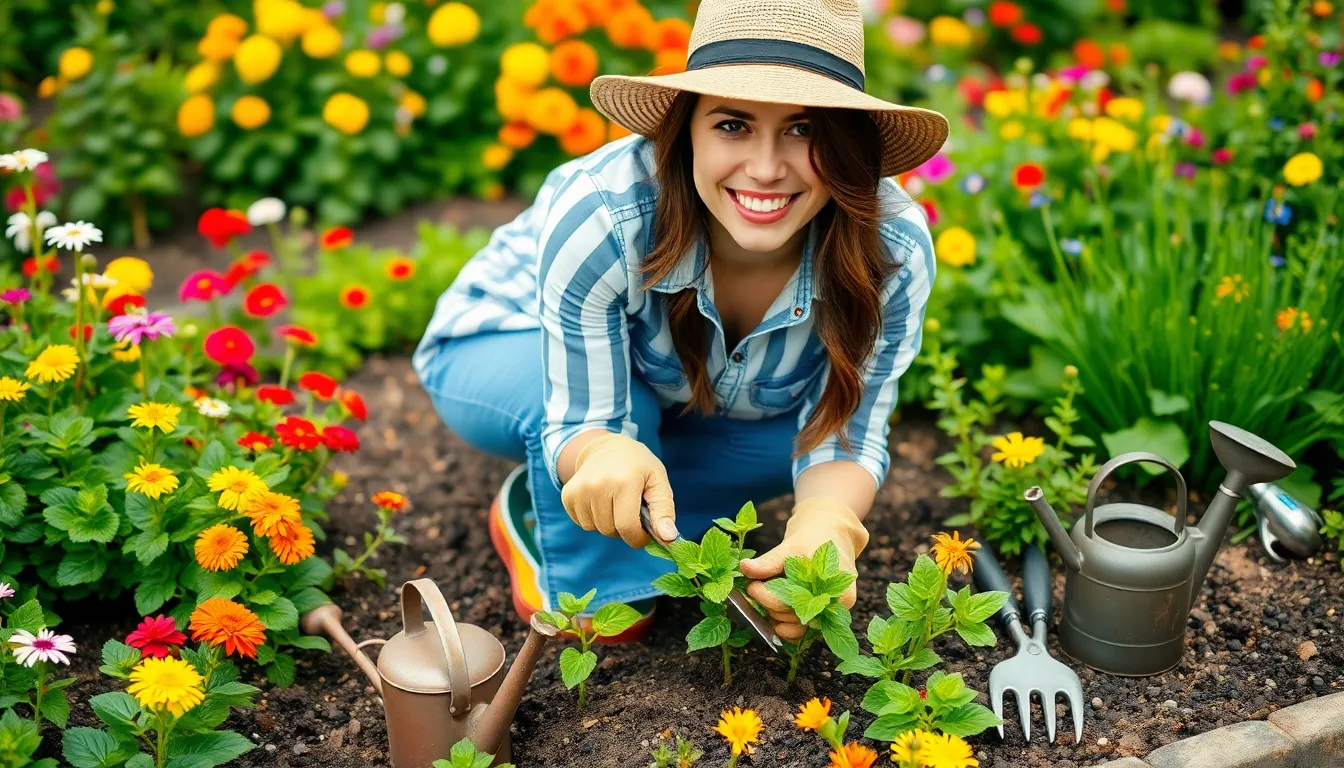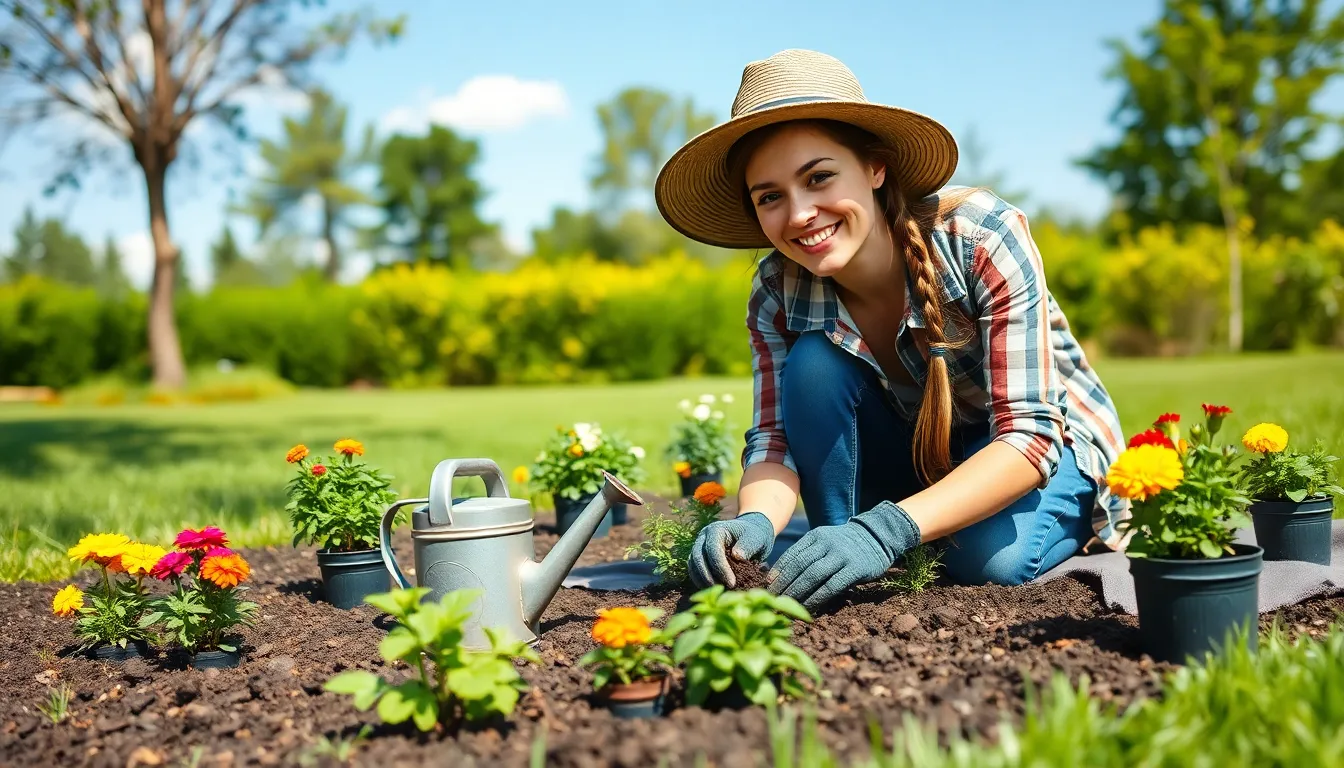Gardening might seem like a daunting task reserved for those with green thumbs and a lifetime of experience. But fear not! Anyone can cultivate a thriving garden with just a bit of patience and a sprinkle of humor. Imagine stepping into your backyard and feeling like a horticultural wizard, transforming tiny seeds into vibrant blooms and delicious veggies. Sounds magical, right?
Table of Contents
ToggleUnderstanding Gardening Basics
Gardening serves as a productive endeavor for both relaxation and food production. Beginners can reap numerous benefits from cultivating plants and flowers.
Importance of Gardening for Beginners
Gardening offers physical and mental health benefits. It promotes physical activity, reducing stress levels and enhancing mood. Fresh produce grown in gardens provides people with better nutritional options. Engaging in gardening fosters a sense of accomplishment and boosts confidence. Social skills improve as individuals connect with others who share similar interests. Investments in gardening also yield long-term financial savings through homegrown harvests.
Common Misconceptions About Gardening
Some people believe gardening requires extensive expertise or specialized knowledge. In reality, individuals can start with simple plants and gradually expand their skills. Others fear that gardens demand constant attention, but many plants thrive with minimal care. Budding gardeners might also think they need expensive tools. Basic equipment often suffices for beginners to achieve satisfying results. Finally, some assume gardening is limited to outdoor spaces; container gardening allows for planting in various environments, including balconies or small yards.
Essential Tools and Supplies

Every gardener needs reliable tools and supplies to create a thriving garden. Beginners can start their gardening journey with a few essential items.
Must-Have Tools for New Gardeners
A good pair of gloves protects hands while working in soil. Hand trowels assist with planting seeds or seedlings into gardens. Pruning shears help maintain plant health by trimming overgrowth. A sturdy garden fork loosens soil for better aeration and root development. Additionally, a watering can provides a gentle way to hydrate plants, especially in delicate stages. Each of these tools significantly contributes to successful gardening experiences.
Recommended Supplies for Starting Out
Quality soil is vital for nurturing plants, so selecting the right variety ensures healthy growth. Seeds or seedlings represent the basis for starting a garden, with different types available based on preferences. Mulch retains moisture and suppresses weeds, promoting better plant care. Fertilizers offer essential nutrients that enhance plant development over time. Also, plant markers assist in tracking what’s planted where, making organization easier for new gardeners. These supplies form a solid foundation for any gardening endeavor.
Choosing the Right Plants
Selecting the right plants significantly impacts gardening success. Beginners should consider various factors to ensure a thriving garden.
Factors to Consider When Selecting Plants
Climate plays a crucial role in plant selection. Different regions receive varying levels of sunlight and moisture, so understanding local weather is essential. Soil type also matters; some plants flourish in sandy soil, while others prefer loamy or clay soil. Additionally, consider space availability. Container gardening suits small areas, while larger spaces allow for diverse plant choices. The level of care required is important too. Low-maintenance plants can boost confidence while building skills for more challenging varieties. Finally, individual preferences for aesthetics and edible produce shape plant selection.
Best Plants for Beginners
Some plants suit beginners exceptionally well. Herbs like basil, parsley, and cilantro grow quickly and offer culinary benefits. Vegetables such as radishes, lettuce, and green beans thrive with minimal care. Easy-to-grow flowers include marigolds, sunflowers, and pansies, adding color and charm. Succulents provide an excellent low-maintenance option for indoor gardening. Each of these plants encourages beginners to develop green thumbs while enjoying the rewards of their labor.
Basic Gardening Techniques
Gardening techniques are essential for beginners to understand in order to cultivate healthy plants. Mastering these basics sets a solid foundation for a flourishing garden.
Soil Preparation and Enrichment
Soil preparation significantly influences plant health. A well-balanced mix of organic matter and nutrients ensures proper growth. Begin by testing soil pH and nutrient levels using simple kits available at garden centers. Amending soil can involve adding compost, aged manure, or peat moss to enhance moisture retention and boost fertility. Mixing these amendments uniformly throughout the planting area improves root development. Furthermore, tilling the soil to a depth of at least 12 inches aerates it and promotes better drainage. Properly enriched soil achieves optimal growing conditions, providing plants with essential nutrients and encouraging vigorous growth.
Watering and Maintenance Tips
Watering is crucial for plant survival and growth. Establish a consistent watering schedule, focusing on early mornings or late afternoons to reduce evaporation. Deep watering encourages roots to grow deeper, making plants more resilient. A general guideline involves providing about one inch of water per week, but this may vary based on plant type and local climate. Observing plants for signs of wilting or yellowing leaves aids in determining water needs. Additionally, applying mulch around plants helps retain soil moisture and suppress weeds. Regular maintenance tasks, such as weeding and checking for pests, ensure plants stay healthy and thriving throughout the growing season.
Troubleshooting Common Issues
New gardeners often face challenges with pests and diseases. Identifying and addressing these issues early ensures healthy plants.
Identifying and Preventing Pests
Pests can devastate a garden if not managed promptly. Inspecting plants regularly reveals signs of trouble like holes in leaves or sticky residue. Familiarizing with common pests, such as aphids and caterpillars, aids in prevention. Introducing beneficial insects, like ladybugs, naturally controls pest populations. Using barriers, such as nets, prevents access to vulnerable plants. Regularly cleaning garden areas reduces pest attractants, improving overall plant health.
Managing Plant Diseases
Diseases can also threaten plant vitality, but early detection helps curb their spread. Observing symptoms like yellowing leaves or wilting signals an issue. Practicing crop rotation minimizes disease occurrence by disrupting pathogen life cycles. Ensuring good air circulation around plants limits humidity levels that foster disease growth. Selecting disease-resistant plant varieties enhances resilience and long-term success. Treating infections immediately with appropriate fungicides or organic solutions stops issues before they escalate.
Gardening opens a world of possibilities for beginners ready to embrace nature. With the right mindset and essential tools anyone can cultivate a thriving garden. The journey from seed to plant offers not just beauty and nourishment but also a rewarding sense of accomplishment.
By starting with easy plants and gradually expanding their skills new gardeners can build confidence and enjoy the therapeutic benefits of gardening. Whether it’s growing herbs in a small container or nurturing vibrant flowers in a backyard every effort contributes to personal growth and well-being.
With patience and a willingness to learn challenges become stepping stones to success. Gardening is a fulfilling adventure waiting to be explored.



